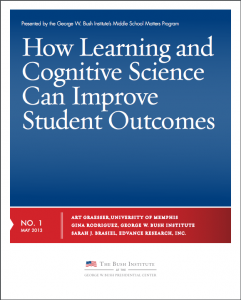 Teachers can implement cognitive principles to increase the depth and efficiency of student learning across all content areas in the middle grades.
Teachers can implement cognitive principles to increase the depth and efficiency of student learning across all content areas in the middle grades.
Overview of Cognitive Science and Advanced Reasoning Principles and Practices
Principle 1: Distribute presentation, practice, and testing over time.
- Practice 1: Present material at di erent points in time in different contexts.
- Practice 2: Test or challenge students frequently.
- Practice 3: Use cumulative tests.
Principle 2: Ground ideas in active, engaging experiences.
- Practice 1: Present visual depictions of core concepts and ideas.
- Practice 2: Encourage students to manipulate aspects of core concepts.
- Practice 3: Capture content in stories.
Principle 3: Provide timely, qualitative feedback on students’ learning activities.
- Practice 1: Give students timely and accurate feedback on their performance.
- Practice 2: Include qualitative explanations in feedback for complex material.
- Practice 3: Adjust negative feedback to what the student can emotionally handle.
Principle 4: Encourage the learner to generate content.
- Practice 1: Assign tasks that require writing or other forms of generation.
- Practice 2: Arrange for students to teach other students.
Principle 5: Select challenging tasks that require explanations, reasoning, and problem solving.
- Practice 1: Assign tasks that require explanation-based reasoning.
- Practice 2: Ask students deep questions and train students to ask deep questions.
- Practice 3: Present desirable di culties that place the student in cognitive disequilibrium.
Principle 6: Design curricula, tasks, and tests in di erent contexts, media, and practical applications.
- Practice 1: Vary the context and applications of tasks and problems.
- Practice 2: Present learning materials through multiple media.
- Practice 3: Encourage students to construct ideas from multiple points of view and different perspectives.
Principle 7: Promote self-regulated learning.
- Practice 1: Train students on metacognition and strategies for self-regulated learning.
- Practice 2: Provide students with an open learning environment.